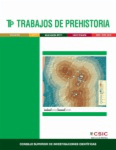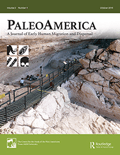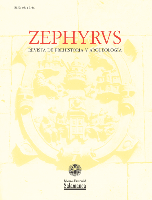
Trabajos de Prehistoria
metrics 2024
Advancing Archaeological Insights for a Deeper Understanding of Our Past
Introduction
Trabajos de Prehistoria is a distinguished peer-reviewed journal published by the Consejo Superior de Investigaciones Científicas (CSIC) since 1988, and it has established itself as a vital resource in the field of archaeology and prehistory. With an impressive impact factor and an open access policy, the journal aims to disseminate high-quality research that contributes to the understanding of human history and prehistorical studies. This Spanish journal has consistently ranked in the top quartile (Q1) in both the Arts and Humanities and Social Sciences categories, reflecting its significance in advancing archaeological scholarship, with Scopus rankings placing it in the 85th percentile among its peers. Covering a broad scope of topics related to archaeology, it serves as a platform for innovative research that connects researchers, professionals, and students globally, enhancing academic dialogue and fostering interdisciplinary collaboration. Based in Madrid, European researchers and global academics alike benefit from its open access model, promoting wider distribution and accessibility of foundational studies in the field.
Metrics 2024
 0.70
0.70 1.30
1.30 1.20
1.20 26
26Metrics History
Rank 2024
Scopus
IF (Web Of Science)
JCI (Web Of Science)
Quartile History
Similar Journals

PaleoAmerica
Bridging Past and Present in the AmericasPaleoAmerica, published by Routledge Journals, Taylor & Francis Ltd, is a leading academic journal dedicated to advancing the study of ancient peoples of the Americas. With a strong presence in the fields of archaeology, ecology, and paleontology, this journal holds Q1 rankings in its respective categories for 2023, reflecting its exceptional impact and relevance in academia. Covering a broad spectrum of topics related to human and ecological evolution from 2015 to 2024, PaleoAmerica serves as a vital resource for researchers, professionals, and students eager to explore pivotal findings and theories related to the prehistoric populations of North and South America. While the journal operates under a subscription model, its comprehensive scope and high-quality peer-reviewed articles make it indispensable for those engaging with the complex narratives of ancient American life.

Complutum
Connecting Scholars Through Timeless DiscoveriesComplutum, published by the Universidad Complutense de Madrid, serves as a leading academic journal in the fields of Archeology and History. With a notable track record since its inception and a convergence stretching from 2011 to 2024, the journal has established itself as a pivotal platform for scholarly discourse in these disciplines. Recognized in 2023 with a Q2 ranking in Archeology and Arts and Humanities, as well as a Q1 ranking in History, Complutum demonstrates its commitment to quality research, attracting contributions from leading experts and emerging scholars alike. The journal's impact is further evidenced by its competitive ranks within various Scopus categories, particularly its placement in the 77th percentile for History and 64th for Archeology. As a printed publication without open access options, Complutum caters to a specialized audience, providing a forum for in-depth analysis and discussion on archaeological findings and historical interpretations. Researchers, professionals, and students engaged in these fields will find Complutum an invaluable resource for advancing knowledge and fostering academic collaboration.

Cuadernos de Prehistoria y Arqueologia-Universidad Autonoma de Madrid
Bridging Disciplines in Prehistoric StudiesCuadernos de Prehistoria y Arqueologia-Universidad Autonoma de Madrid is a distinguished academic journal dedicated to the fields of archaeology and prehistory, published by the Universidad Autonoma de Madrid, Departamento de Prehistoria y Arqueología. With an ISSN of 0211-1608, this journal plays a crucial role in disseminating significant research findings and theoretical advancements within these domains. Recognized for its scholarly excellence, it holds impressive quartile rankings in 2023, including Q2 in Archaeology and Q1 in History, reflecting its high impact within the academic community. While currently not an open-access publication, Cuadernos de Prehistoria y Arqueologia provides valuable insights to researchers, professionals, and students engaged in the exploration of human history and cultural heritage from 2018 to 2024 and beyond. With a commitment to fostering interdisciplinary dialogue, this journal serves as an essential platform for innovative studies and comprehensive reviews, contributing to the advancement of knowledge in archaeology and prehistory.

Archeologicke Rozhledy
Advancing archaeological scholarship for a global audience.Archeologicke Rozhledy, published by the Academy of Sciences of the Czech Republic, Institute of Archaeology, is a pivotal open-access journal dedicated to advancing the field of archaeology. Since transitioning to open access in 2019, it has made significant strides in disseminating high-quality research, serving as a vital resource for researchers, professionals, and students alike. With an ISSN of 0323-1267, the journal has gained recognition for its contributions in the domains of arts and humanities, particularly archaeology, as evidenced by its 2023 Q2 ranking in both categories. Operating out of the historical city of Prague, the journal encompasses a broad scope of archaeological scholarship, reflecting a commitment to interdisciplinary approaches and fostering dialogue within the global archaeological community. With its notable Scopus rankings—#115/413 in Arts and Humanities and #113/354 in Social Sciences—Archeologicke Rozhledy stands as a crucial outlet for innovative research and scholarly exchange.

Zephyrus-Revista de Prehistoria y Arqueologia
Championing Cutting-Edge Research in ArchaeologyZephyrus-Revista de Prehistoria y Arqueologia, published by UNIV SALAMANCA, EDICIONES, is a renowned academic journal dedicated to the fields of archaeology and prehistory. Since its inception in 1950, the journal has embraced an Open Access model, facilitating widespread access to cutting-edge research and scholarly discourse while fostering global collaboration among researchers. Based in Salamanca, Spain, this journal has achieved remarkable recognition, evidenced by its Q1 rankings in Archaeology and History as of 2023, and impressive Scopus standings across various categories, including an 83rd percentile in History. The journal's comprehensive scope since 2011 has made it a vital resource for academics seeking to deepen their understanding of human history through archaeological insights. Zephyrus not only provides a platform for disseminating innovative research findings but also serves as a bridge between historical scholarship and contemporary archaeological practices, ensuring that researchers, professionals, and students alike have access to the latest developments in the field.

Fornvannen-Journal of Swedish Antiquarian Research
Delving into the Richness of Swedish AntiquitiesFornvannen - Journal of Swedish Antiquarian Research is a distinguished peer-reviewed journal dedicated to advancing the field of antiquarian studies through rigorous research and scholarship. Published by the Royal Academy Letters, History & Antiquities in Sweden, this journal has been a cornerstone of archaeological and historical discourse since its inception in 1978. It currently holds an esteemed position in the Q3 category in both Archaeology and History as per the 2023 assessments, reflecting its commitment to promoting high-quality academic contributions. With an ISSN of 0015-7813 and an E-ISSN of 1404-9430, Fornvannen provides insights into Swedish antiquities and serves as a vital resource for researchers and scholars eager to explore the nuances of archaeological and historical findings. Although not an open-access journal, it offers a comprehensive platform for the dissemination of knowledge within the fields of arts and humanities. As it continues its journey from 2011 to 2024, Fornvannen remains pivotal in fostering scholarly dialogue and enhancing our understanding of Sweden’s rich historical tapestry.

Vinculos de Historia
Illuminating the Past, Inspiring the FutureVinculos de Historia, published by the University of Castilla-La Mancha, is a distinguished open-access journal that has been contributing to the field of history since its inception in 2012. Based in Spain, it serves as a vital scholarly platform for historians and researchers alike, engaging with various historical methodologies and perspectives. With an impressive Q2 ranking in the 2023 Scopus Arts and Humanities Category, it ranks at #803 out of 1760 journals, placing it in the top 54th percentile of its field. The journal is committed to disseminating high-quality research articles that foster a deeper understanding of historical narratives and their implications. By providing unrestricted access to peer-reviewed content, Vinculos de Historia not only enhances scholarly discourse but also encourages collaboration among academics, professionals, and students globally. Located at FAC Letras Ciudad Real, the journal stands as a testament to the robust intellectual tradition of the University of Castilla-La Mancha.

Gladius
Unveiling Historical Narratives through Peer-Reviewed ScholarshipGladius is a prestigious academic journal dedicated to the field of History, published by CONSEJO SUPERIOR INVESTIGACIONES CIENTIFICAS-CSIC in Spain. With an ISSN of 0436-029X and E-ISSN 1988-4168, this journal has been a cornerstone for historical scholarship since it became Open Access in 1961, providing free and unrestricted access to its rich array of studies. Having achieved a commendable Q2 ranking in the Arts and Humanities History category for 2023, Gladius is recognized for its rigorous peer-reviewed articles that contribute significantly to the understanding of historical contexts and developments. It is indexed within Scopus, ranked #659 out of 1760 in its field, and boasts a 62nd percentile, highlighting its relative prominence among its peers. Located in Madrid, Spain, Gladius continues to foster intellectual growth and debate, making it an invaluable resource for researchers, professionals, and students seeking to deepen their knowledge and engage with contemporary historical discourse.

Lucentum
Where History Meets InnovationLucentum is a distinguished open-access journal published by Universidad de Alicante, focusing on the interdisciplinary fields of Archeology, History, and Paleontology. Since its inception in 1982, it has established itself as a vital platform for scholars and researchers to disseminate their findings, contributing significantly to the academic landscape in Spain and beyond. The journal's notable rankings, including Q1 status in History and Q2 in Archeology, reflect its commitment to high-quality scholarship and rigorous peer review. With an impressive impact factor and recognition in Scopus, Lucentum serves as an essential resource for professionals, students, and historians, fostering a deeper understanding of cultural and historical contexts through a wealth of interdisciplinary research. The journal continues to embrace open access, ensuring that critical knowledge is freely available to the global research community.

Lanx-Journal of the Scuola di Specializzazione in Archeologia of the University of Milan
Advancing archaeological scholarship for a global audience.Lanx-Journal of the Scuola di Specializzazione in Archeologia of the University of Milan, published by Milano University Press, is a distinguished platform dedicated to the field of archaeology. Committed to advancing archaeological research and scholarship, this Open Access journal has been available to the global academic community since 2008, facilitating easy dissemination of innovative ideas and findings. With a strong emphasis on promoting interdisciplinary dialogue, the journal covers a wide range of topics from classical archaeology to contemporary practices, making it an invaluable resource for researchers, professionals, and students in the field. Situated in the historic city of Milan, it aims to contribute to the preservation and understanding of cultural heritage through rigorous academic inquiry and collaboration.